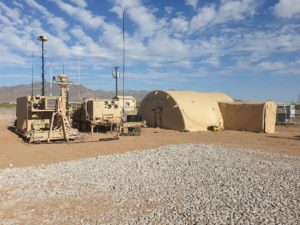The Army on Thursday awarded Northrop Grumman [NOC] a potential $1.4 billion deal covering low-rate initial production and full-rate production for the Integrated Air and Missile Defense Battle Command System (IBCS).
The deal, which was competitively awarded with two bids submitted, covers delivery of up to 160 systems “to support the modernization of air and missile defense for the U.S. Army and foreign partners,” according to the Army.

It was not disclosed as of Defense Daily’s deadline who the other competitor was that submitted a bid for the production contract.
“In partnership with the U.S. Army, Northrop Grumman will deliver IBCS to the warfighter, bringing its critical all domain capabilities to the changing battlefield. It’s also a major milestone in the extension of our open systems architecture approach to JADC2,” Mary Petryszyn, corporate vice president and president for Northrop Grumman Defense Systems, said in a statement to Defense Daily.
IBCS is the Army’s future missile defense command platform, designed to integrate and connect the service’s full range of “sensor to shooter” capabilities.
“IBCS is a keystone Army Futures Command program that will provide a decisive battlefield advantage through weapon and sensor integration and a common mission-command system across all domains, delivering an integrated fires capability to the warfighter while improving battle space awareness, decision timing and protection against threats in complex integrated attack scenarios,” the Army wrote in a statement.
The Army noted the five-year production deal was “the first significant competition for this major defense acquisition program since the 2009 award of the engineering and manufacturing development contract.”
A full rate-production decision for IBCS is slated for fiscal year 2023, according to the Army.
The Army had invested $2.9 billion into IBCS as of January, when the program received a Milestone C decision to move into production, with Northrop Grumman having handled the development and prototyping of the program.
As of the summer, the Army had conducted six developmental flights tests with IBCS along with two additional operational tests completed during last year’s Limited User Test event.
A July risk reduction test with IBCS featured the “widest variety of sensors to date,” to include incorporating the Marine Corps’ new AN/TPS-80 Ground/Air Task-Oriented Radar system, also built by Northrop Grumman, in an electronic attack scenario (Defense Daily, July 15).